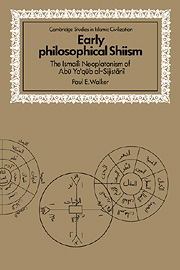Book contents
- Frontmatter
- Contents
- Preface
- Acknowledgments
- Note on transliteration
- List of abbreviations
- PART I AL-SIJISTĀNĪ'S HERITAGE
- PART II AL-SIJISTĀNĪ'S UNIVERSE
- 4 Introduction: categories of thought and terms of analysis
- 5 A theology of unqualified transcendence
- 6 Creation as command
- 7 Intellect, the sum of existent being
- 8 Descending and ascending soul
- 9 Nature and the physical realm
- 10 A cosmic anthropology
- 11 Prophecy, the deputy of intellect
- 12 Interpretation and its institution
- 13 Salvation and the womb of history
- EPILOGUE: THE USE AND CONTROL OF REASON
- Notes
- Select bibliography
- Index
5 - A theology of unqualified transcendence
Published online by Cambridge University Press: 02 November 2009
- Frontmatter
- Contents
- Preface
- Acknowledgments
- Note on transliteration
- List of abbreviations
- PART I AL-SIJISTĀNĪ'S HERITAGE
- PART II AL-SIJISTĀNĪ'S UNIVERSE
- 4 Introduction: categories of thought and terms of analysis
- 5 A theology of unqualified transcendence
- 6 Creation as command
- 7 Intellect, the sum of existent being
- 8 Descending and ascending soul
- 9 Nature and the physical realm
- 10 A cosmic anthropology
- 11 Prophecy, the deputy of intellect
- 12 Interpretation and its institution
- 13 Salvation and the womb of history
- EPILOGUE: THE USE AND CONTROL OF REASON
- Notes
- Select bibliography
- Index
Summary
No area of doctrine seems to have captured al-Sijistānī's attention and creativity like that surrounding the problem of defining tawḥīd. This particular concern for a pure expression of God's absolute transcendence is itself surely almost a universal feature of Islamic theologies. Thus, it is not at all strange that al-Sijistānī sees this as the most significant new teaching of Muḥammad and that the greatest advance brought to mankind by this prophet is exactly the refinement he contributed to the understanding of God's unique oneness. If there were no other purpose in the prophet mission of Muḥammad, his formulation of Islam's monotheistic credal statement “There is no god but God” would alone constitute an adequate and sufficient reason to follow him over the great lawgiving prophets of the prior eras.
This was equally a field of philosophical speculation, even for the ancient Greeks, for whom, or at least for some of whom, the origin of all things had to be absolutely one – a one in which there exists no multiplicity in any sense. In Plato the ultimate principle is the One or the Good and it is beyond being. As in Plotinus later it transcends being by also transcending non-being. It is not non-being, which would be expressed in Greek an-ousion, but hyper-ousion, above being altogether. The One refuses all predication.
- Type
- Chapter
- Information
- Early Philosophical ShiismThe Isma'ili Neoplatonism of Abu Ya'qub al-Sijistani, pp. 72 - 80Publisher: Cambridge University PressPrint publication year: 1993



